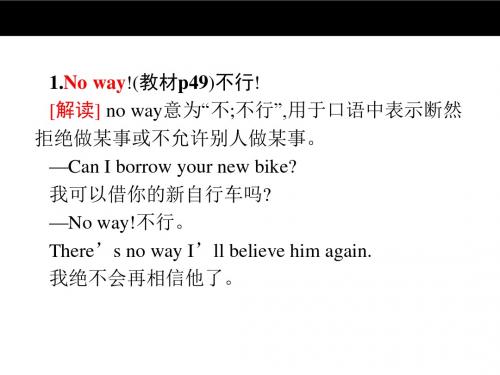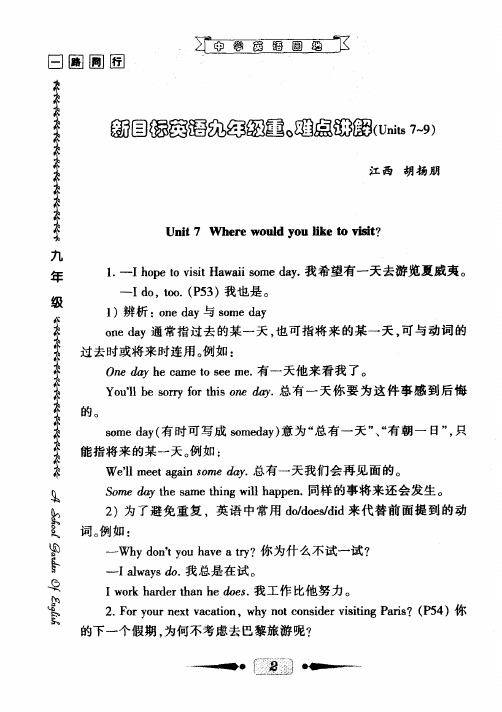中考状元笔记新目标九年级英语7
人教版新目标英语九年级Unit7全单元 ppt课件

watch TV
listen to music
make my room a mess
人教版新目标英语九年级Unit7全 单元
Do your parents allow you to choose your own clothes? No, they don’t.
AD
2. Sixteen-year-olds should be allowed to
drive.
AD
3. Students should not be allowed to have
part-time jobs. A D
4. Sixteen-year-olds should be allowed to
1. Anna can go to the shopping center by
bus. T F
2. Anna wants to get her ears pierced.
TF
3. Anna wants to choose her own clothes.
TF
人教版新目标英语九年级Unit7全
单元
1c Look at the statements in la and make conversations.
人教版新目标英语九年级Unit7全 单元
人教版新目标英语九年级Unit7全 单元
Do your parents allow you to watch TV? Yes, they do.
You are allowed to watch TV.
allow sb. to do sth. be allowed to do sth.
A: I don’t think sixteen-year-olds should be allowed to drive.
人教版新目标英语九年级全册Unit 7

[解读3] get their ears pierced 此处get用作使役动词,意为“使,让”为 “get/have+sth.+过去分词”结构,表示“叫/让/请别 人做某事”,其中过去分词表示的动作往往是别 人做的,与句子的主语无关。 eg: I got my car repaired. When are you going to get your hair cut? My bike is broken. I’ll get/have it repaired. 我的自行车坏了,我要让人修理一下。
[解读2] allow sb to do sth 允许某人做某事 eg. The teacher allowed him to go into the classroom.
allow doing sth 允许做某事 eg. We don't allow smoking in public.
be allowed to do sth 被允许做某事 eg. Passengers are not allowed to smoke. 例1:Do you think thirteen-year-olds should be allowed to take part-time jobs? 你认为应该允许13岁的孩子们做兼职工作吗? 例2: Anna is allowed to choose her own clothes. 安娜可以选择自己的衣服。
4.When I was a tiny baby crying all night, my mom sang to me and stayed by my side.(教材P51) 当我还是一个整夜哭闹的小宝 宝时,妈妈会给我唱歌,陪伴在我身旁。
[解读1] crying all night是动词-ing形式短语,在名词 baby后作后置定语,起修饰名词的作用。 Do you know the young man waiting outside the school gate? 你认识在校门外等待的年轻人吗? [解读2] stay by one’s side意为“在某人身边(给予照 顾或支持)”,相当于be at one’s side。 Don’t worry. I will always be at your side. 不要担心,我会一直在你身边。
新目标英语九年级重、难点讲解(Units 7-9)

注 意 : “ ydd ’yu+动 词原形 …? Wh in o t ”用 于 对过 去该 做 而没 有 做 的事情 的原 因提 问 , 含有 责备 的 口气 。 例如 : h int o ot sh o etra?昨天 你为什 么没 去上学 ? ydd 'y ug c ol s d y o y e 2 o s e 用 作及 物 动词 时 ,意为 “ )cni r d 思考 ” “ 、 考虑 ”相 当于 tik hn
3 .Pa i s t e c pi lo a c n s o e o h i ei s ii s i rs i h a t fFr n e a d i n f t e lv le t cte n a
E rp . P 4 uo e ( 5 )巴黎是 法 国的首都 , 也是 欧洲 最有 活力 的城市 之一 。 l ei t i l s 是形 容 词 l ey的最 高级形 式 。 为 “ 活力 的 ” “ v e il v 意 有 、 生气 勃 勃 的” 它 可用 于指人 也可 用于指 物 , 常在句 中作 定语 或表语 。 如 : 。 通 例 E e tigi l e ee 这 儿一 切都生 气勃 勃 。 vr hn v l h r. y si y
Yo’ esr rti O a. u 1 or f s n d y 总有 一 天 你要 为这 件 事 感 到 后 悔 1b y o h e
的。 smed y 有 时可 写成 smea ) o a ( o d y 意为 “ 总有 一 天 ” “ 、 有朝 一 日” 只 ,
人教版新目标版中考英语复习九年级全册Units7-8优质

经 work hard at school and enter university.我的父母总是教育我 典 在校好好学习,将来考大学多么重要。 句 型
中考考点解读
作出推测(Make inferences) 谈论你被允许做的事(Talk about what you are allowed to do) 5.— Whos volleyball is this ? 这是谁的排球? don't think should be allowed e 1.—I sixteen-year-olds ___________________ —It must be Carla’s. She loves volleyball. 它一定是卡拉 to drive. 我认为16岁的孩子不应该被允许开车。 的。她喜爱排球。 agree serious enough —I . They aren't . 我同意。 6.— Whos hair band is this ?这是谁的发带? e 他们还不够谨慎。 —It could be Mei's hair band. Or it should not be allowed to 2.—Teenagers have partmight belong to Linda. _____________________
14.wolf n. 狼→ wolves (复数) 15.sleep v. 睡觉→ sleepy adj.困倦的;瞌睡的 16.suit v.适合n. 西服;套装→ suitable 当的 17.express v. 表示;表达→ expression 表达方式 18.medicine n. 医学→ medical adj.医疗的;医学的 adj.精力充沛的, energetic n.表情;表示; adj.合适的;适
新目标英语九年级Unit 7 STEP BY STEP 随堂通

新目标英语九年级Unit 7 STEP BY STEP 随堂通作者:来源:《中学生英语·九年级》2023年第11期Step 1I. 根據句意及首字母提示,完成单词。
1. —Excuse me. Can you show me your driver’s l______?—Certainly. Here you are.2. Look at the sign. It says“Smoking is not a______ in the museum.”3. He couldn’t stop l______ when he heard the joke.4. I d______ with him. Wehavedifferentideas.5. What about eating fish i______ of meat?II. 单项选择。
()1. —What rules do you have at your school?—There are many. For example,we aren’t allowed ______ to the Internet bar.A. wentB. goingC. to go()2. —I think sixteen year olds can make their own decisions.—I agree ______ you.A. withB. onC. about()3. He regretted ______ that apartment three years ago.A. not buyingB. not boughtC. not to buy()4. —What are you going to do this afternoon, Andy?—My hair is too long. I want to get my hair ______.A. cutB. to cutC. cuts()5. —Have you finished your work?—No,not yet. I think it’ll take ______ two hours.A. otherB. elseC. another()6. —Let’s go swimming in Hanjiang River after school.—No way! Our parents must ______ our safety if we do.A. talk aboutB. think aboutC. worry aboutStep 2I. 用括号内所给单词的正确形式填空。
新目标九年级英语Unit7 Section B Period one

5. We want to play basketball after
school. Would you like to ____us?
A. invite B. play C. get D. join
6. What would you like to _____us about
your hometown.
2. ._T_r_a_v_e_li_n_g_(travel) by train is the best way to travel.
3.Why__n_o_t_c_o_m__e(not come) here earlier?
4.Shanghai is one of the biggest c_it_ie_s____ (city) in the world.
If you want to travel somewhere relaxing, but you don’t know where to go ,you can ask the travel agency for information.
travel agency
How many kinds of trips do you know?
yours?
-- Oh, yes, it’s mine.
-- Let me ____ for you.
A. to pick up it B. to pick it up
C. pick up it
D. pick it up
2. The teacher asked the boys __ on the wall.
1
Brainstorm a list of things that are important to you when you go on vacations.
新目标英语九年级Unit 7疑难解析
1.Where would you like to go on va-ca tion,Sa m?你想去哪儿度假,萨姆?(p.52)would like意为“愿意,想”,与动词want 同义,would like主要有以下两种用法:(1)“would like+名词”表示征求意见,其肯定答语常为:Yes,please;否定答语为: No,thanks.例如:—Would you like some tea?您想喝些茶吗?—Yes,please.想。
(2)“would like+动词不定式”表示邀请或建议,肯定答语通常为:Yes,I’d like/ love to.否定答语通常为:I’d like/love to, but...。
例如:—Would you like to go shopping with me?你愿意和我一起去买东西吗?-Yes,I’d love to.是的,非常乐意。
2.I hope to s ee Niaga ra Fa lls some day.我希望有一天能去看尼亚加拉大瀑布。
(p.53)hope作动词用时意为“希望”,其后不能接复合宾语,即不能接hope sb.to do sth.结构。
hope的句型主要有两种:(1)hope to do sth.,表示“希望做某事”。
例如:I hope to go there by plane.我希望坐飞机去那儿。
(2)hope+that从句,它强调的希望往往是客观的,一般可以实现的意愿。
例如:I hope that you can come here tomorrow.我希望你明天能来这儿。
3.I like plac es whe re the whe the r isa lwa ys wa rm.我喜欢天气总是暖和的地方。
(p.53)where在这里是关系副词,引导定语从句,修饰名词places,它所引导的定语从句所修饰的先行词一般是表示处所或场所的地点名词,where在从句中作状语。
最新人教新目标版九年级全册英语unit7 知识点精讲精练【含答案】
Unit7 Teenagers should be allowed to choose their own clothes.一、知识点讲解1、get their ears pierced 穿耳洞让/使(别人)做某事此处get用作使役动词,意为"使;让"。
get + sth. + 动词的过去分词意为"使某事被做;请别人做某事",动词的过去分词作宾语补足语,它所表示的动作往往是别人做的。
此结构中的get也可换成have。
例句:I got my car repaired. 我让人修理了我的小汽车。
【拓展】get sth. done (过去分词) = have sth. done (过去分词)例句:I get my car mended. = I have my car mended. 我让别人修好我的车。
2、【辨析】stop doing sth. 与stop to do sth.代词、that/what 引导的从句、动词-ing 形式或动词不定式作宾语。
例句:If you don’t do it now, you’ll regret it. 如果你现在不做,你会后悔的。
例句:I regret what I said. 我非常后悔说了那些话。
【辨析】regret doing sth. 与 regret to do sth.四"记"力争不后悔。
四记指"remember 记得/记住;forget 忘记;mean 计划/打算;go on 继续"。
力争指"try 努力/尽力"。
不后悔指"stop 停止;regret 遗憾/后悔"。
6、allow v . 允许;准许(1) allow sb. to do sth.允许某人做某事例句:Tom doesn’t allow her son to play computer games on school nights.汤姆不允许她儿子在上学的夜晚玩电脑游戏。
(2) be (not) allowed to do sth. (不)被允许做某事例句:Passengers are not allowed to smoke. 乘客不允许吸烟。
人教新目标版九年级英语全册中考考纲词汇详解:Unit 7
13. manage
['mænɪdʒ]
v.
管理,设法完成
词形变化
manager n.管理者,经理
management n.管理
常考短语
manage to do sth设法去做某事
真题例句
I managed to get a job as a waitress in an Italian restaurant.
她嘲笑了我,我感觉很糟。
8. regret
[rɪ'ɡret]
v.
后悔;遗憾
常考短语
regret to say/ tell you很遗憾地说/告诉你
regret doing sth后悔做过某事
经典例句
I regret to tell you that you fail in the exam.
很遗憾告诉你,你考试不及格。
谁刚刚帮贝蒂清理了卧室啊?
munity
[kə'mjuːnəti]
n.
社区,团体
经典例句
He refuses to join any community.
他拒绝参加任何团体。
12. chance
[tʃɑːns]
n.
机会,可能性
常考短语
by chance偶然地
真题例句
Luckily,we’ve had the chance to experience something different.
常考表达
Driving license驾驶证
真题例句
Her name and address were printed on the license, so the boy knew where she lived.
人教新目标九年级英语Unit 7 单元同步常见考点失误解析
Unit 8 It must belong to Carla.1.这个消息不一定是真的。
误:The news must not be true.正:T he news can’t be true.解析:情态动词must意为“一定”,用来表示推测,用在肯定句中。
如:The news must be true.这消息一定是真的。
Mustn’t 意为“不准;不允许”。
如:You mustn’t smoke her.你们不准在这儿抽烟。
can’t 意为“不可能;不太可能”(表示推测某事发生的可能性非常低)。
如:He can't be here, I didn't see him.他不可能在这儿,我没看见他。
[课文要点]A: I wonder if these are Jim’s glasses.B: They can’t be his. He doesn’t wear glasses. (P60)2. 那本词典是我的。
误:The dictionary is belonging to me.误:The dictionary is belonged to me.误:The dictionary belongs to mine.正:The dictionary belongs to me.解析:短语belong to意为“属于”,后跟名词或人称代词宾格,没有被动语态,也不可能用在进行时态中。
如:This book belongs to the library.这本书是图书馆的。
These girls belong to the singing group of Grade Two.这些女孩是二年级歌咏小组的。
[课文要点] It must belong to Carla. (P57)3. 我们班里每个人都喜欢这本书。
误:Everyone in our class like this book.正:Everyone in our class likes this book.解析:everyone (everybody)意为“每个人”,用作主语时,谓语动词用单数形式。
